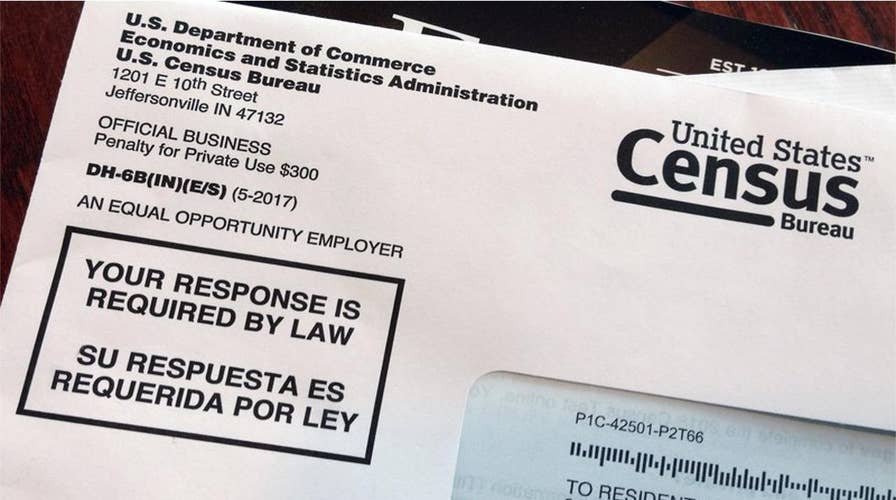Executive order on 2020 census would be a challenge for Trump, Fox News legal analyst says
President Trump will face some 'significant challenges' from Congress if he goes forward with an executive order to put a citizenship question on the 2020 census, Fox News legal analyst Mercedes Colwin says.
Citizenship matters. It marks one’s belonging to a political community; it delineates the privileges and duties inhering in that membership.
Our Constitution takes citizenship seriously, referring to “citizen(s)” or “citizenship” more than 20 times between its original articles and subsequent amendments. Whether one possesses it affects eligibility for elected office, protections for voting, as well as various other rights and privileges. Given its importance to our political community, we should know as best we can how many citizens belong to our polity as well as where they reside within our great country.
But a public battle continues over whether the Commerce Department can ask about a person’s citizenship on the upcoming 2020 Census. Among other protests, opponents of the question claim that the national government possesses no Constitutional power to ask the question.
TRUMP EXPECTED TO ANNOUNCE EXECUTIVE ACTION ON CENSUS QUESTION
Despite remanding the case for other reasons, the Supreme Court rejected this position, affirming the question’s Constitutionality. But the Court’s justification was inadequate. For it failed sufficiently to explain where and how the Constitution’s text supported the census question. While that point received only passing, obscure attention, the Court leaned predominately on longstanding practice; it was Constitutional in the main because the national government had made such inquiries back as far as 1790.
But the Court should have done better. It should have given this text-based justification primacy, fully excavating and explicating it for the public.
That justification does not stem from the census clause. This provision, found in Article I, Section 2, says that the national government must make an “Enumeration” of persons in the country, repeating the endeavor “every subsequent Term of ten Years.” Moreover, here the Constitution declares its purpose for doing so: to apportion among the states both “direct Taxes” and representation in the House of Representatives.
Neither this grant of power nor its stated purpose say anything about counting citizens. Taken in isolation, we could conclude that the national government possesses no such authority.
Instead, the real, barely-mentioned power for asking the question resides elsewhere, in the “Necessary and Proper” clause. This provision comes at the end of Article I, Section 8. After listing permissible subjects for congressional legislation, the section concludes by saying that Congress can make any laws either “which shall be necessary and proper for carrying into Execution the foregoing Powers” or for carrying out any other authority given to the federal government.
The relationship between the listed powers and the Necessary and Proper clause is one of ends to means. While the Constitution enumerates those ends, it wisely leaves the means more open; how Congress chooses to pursue the listed goals is subject only to the standard that its means are necessary and proper to the stated purposes.
The citizenship question fits the bill. The national government could use citizenship data for a number of the national government’s enumerated tasks. In Article II, for example, the president “shall take Care that the Laws be faithfully executed.”
Many laws the president must enforce confer privileges and demand responsibilities based upon citizenship. Knowing the number and placement of those holding such privileges and responsibilities can aid in allocating law enforcement resources. Another example pertains to the Elections Clause of Article I, Section 4, which gives Congress the power to override state laws conducting federal elections. Citizenship data also may help with enforcing these provisions, essential to the integrity of our popular government.
Thus, asking the citizenship question does not go beyond the national government’s authority to conduct a census. Instead, it aids in the pursuit of legitimate governmental purposes.
CLICK HERE TO GET THE FOX NEWS APP
Is the census the only place the government can and does collect citizenship data? No. But doing so alongside the census is a matter of convenience – a choice of means well within the national government’s discretion. In fact, we must consider this defense of the citizenship question alongside the various other demographic inquiries the census asks every 10 years. For all of them ultimately rest on the same ground – collecting data helpful to pursuing legitimate governmental goals.
No more precious citizenship exists today than inclusion in the American polity. A government knowing more about our citizens is better equipped to maintain that coveted status. Doing so through the 2020 Census is more than reasonable. It is more than long-standing in practice. As the Supreme Court should have better explained, it is supported by the “supreme law of the land”: the text of the Constitution.









































